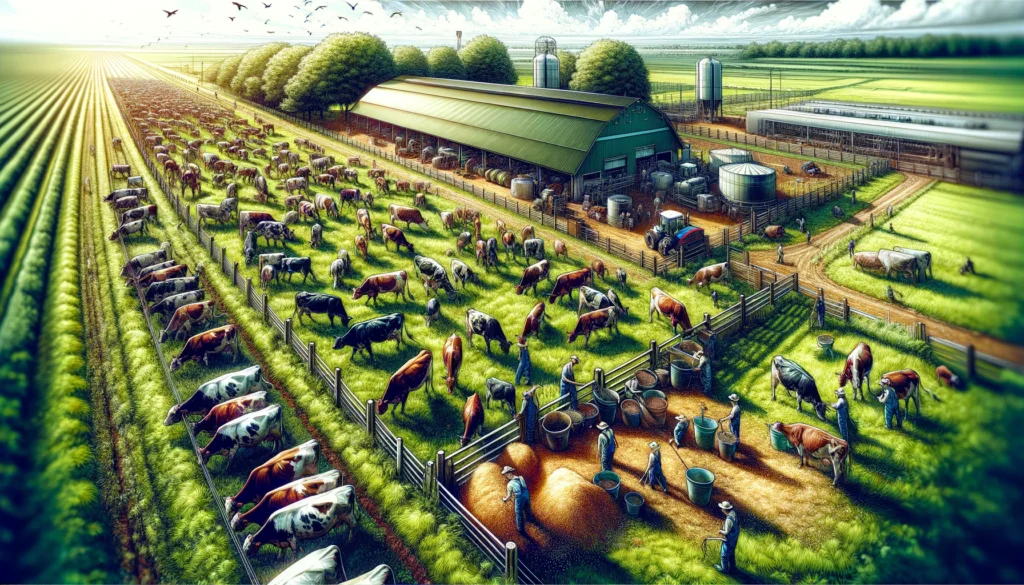Have you ever stared into the eyes of a cow? It’s a deep, philosophical gaze that challenges you to rethink your life choices – specifically, why you’re not in the lucrative and endlessly fascinating world of cattle farming. Not only can cattle turn grass into steak (which might be the closest we come to real alchemy), but they also provide a treasure trove of benefits that stretch from the dinner plate to the bank account. So, buckle up, put on your best cowboy boots, and let’s trot through the ten compelling reasons why getting into cattle farming might just be the best decision since sliced bread–which, coincidentally, goes great with a beef sandwich.

- 10 Benefits of Cattle Farming
- Economic Stability
- Job Creation
- Sustainable Land Management
- Recycling Nutrients
- Cultural Significance
- Renewable Energy Source
- Biodiversity
- Food Security
- Educational Opportunities
- Personal Fulfillment
- 10 Facts About Cattle Farming
- Summary: Why Not Cattle Pro-cow-tivity?
- FAQ: Delving into the Bovine World
- What are the advantages of cattle?
- Why do people want cows?
- Why are cows so peaceful?
- What is unique about cattle?
10 Benefits of Cattle Farming
Economic Stability
Cattle farming is not just about herding animals; it’s a business that contributes significantly to local and national economies. From selling beef to dairy products and leather goods, a well-managed herd can be the gift that keeps on giving.
Job Creation
Whether it’s on-farm positions or associated industries like feed production, veterinary care, and meat processing, cattle farming creates employment. It’s a sector that supports rural communities and keeps small towns bustling with activity–or should we say moo-ving?
Sustainable Land Management
Cattle can be environmental stewards. By grazing, they help manage land that might otherwise be susceptible to bushfires. Plus, their hooves help aerate the soil, proving that even their footprints have a purpose.
Recycling Nutrients
Cows have a unique ability to upcycle inedible plant materials into high-quality protein. They also contribute to soil fertility through their manure, which is rich in nutrients–yes, even their waste is productive!
Cultural Significance
In many cultures, cattle have historical and ongoing significance, from traditional farming methods to roles in ceremonies and festivals. Owning cattle is often a mark of wealth and social status.
Renewable Energy Source
Methane from cows might be problematic, but it’s also a potent source of biogas. Innovative farmers use digesters to convert waste into energy, powering everything from milking machines to entire neighborhoods.
Biodiversity
Well-managed cattle farms support biodiversity by maintaining habitats that sustain a variety of other species, from birds to beneficial insects and plants.
Food Security
By producing meat and dairy, cattle farming plays a critical role in global food security. It ensures that populations have access to high-quality protein and essential nutrients.
Educational Opportunities
Farms are fantastic outdoor classrooms. They offer hands-on learning about biology, economics, and environmental stewardship, making every day a school day–but way more fun.
Personal Fulfillment
There’s something inherently fulfilling about working with land and livestock. It connects farmers to the cycles of life and the earth, providing a sense of accomplishment and grounding.
10 Facts About Cattle Farming
- Cattle were one of the first animals to be domesticated, around 10,500 years ago.
- The global cattle population is well over 1 billion.
- India has the largest number of cattle in the world, followed by Brazil and China.
- The average cow chews at least 50 times per minute.
- A dairy cow can produce more than 125 glasses of milk per day.
- Cattle farming contributes to approximately 40% of the global value of agricultural production.
- There are over 250 breeds of cattle worldwide.
- The gestation period for a cow is about nine months, similar to humans.
- Beef farming uses about three-quarters of the world’s agricultural land.
- Some farms use virtual reality to help cows relax and produce more milk.
Summary: Why Not Cattle Pro-cow-tivity?
So, there you have it–ten udderly compelling reasons to consider cattle farming as more than just a way to fill your plate. It’s about fostering community, sustaining the land, and participating in a cycle of life that dates back thousands of years. Plus, let’s be honest, who doesn’t want to spend their days saying, “This is udderly fantastic!”?
FAQ: Delving into the Bovine World
What are the advantages of cattle?
Cattle are not just walking future steaks; they’re multifaceted beasts with a plethora of benefits. First, they’re agricultural goldmines–providing milk, meat, and leather. They’re also ecological lawn mowers, keeping the grass down and fertilizing as they go. Plus, in some biogas systems, their manure is a renewable energy source that can help power entire farms. In essence, if cows were a stock, they’d be considered a very stable investment!
Why do people want cows?
People’s desire for cows isn’t just about having something large and bovine to look at. Cows are a cornerstone of the dairy and meat industries, making them economically essential. On a smaller scale, owning cows can be a way of life and tradition, providing families with a self-sustaining source of food and income. And let’s be honest, who hasn’t wanted their own cow to enter the local fair’s biggest cow competition?
Why are cows so peaceful?
Ever noticed that cows have a perpetually Zen demeanor? This could be because they have no real predators in the farmyard and spend most of their days doing what they love–grazing, chewing cud, and contemplating the grassy existence. Some say if cows were philosophers, they’d be the stoics of the animal kingdom, teaching us all a lesson in chilling out and focusing on the grass beneath our feet.
What is unique about cattle?
Cattle might seem like just another part of farm scenery, but they have some unique traits. For instance, their stomachs are a wonder of nature with four compartments, allowing them to digest tough plant material we can’t stomach. They can also identify individual cow friends and hold grudges for months or years. Plus, cows have nearly 360-degree panoramic vision–they might not read philosophy, but they can certainly see it coming from all angles!







